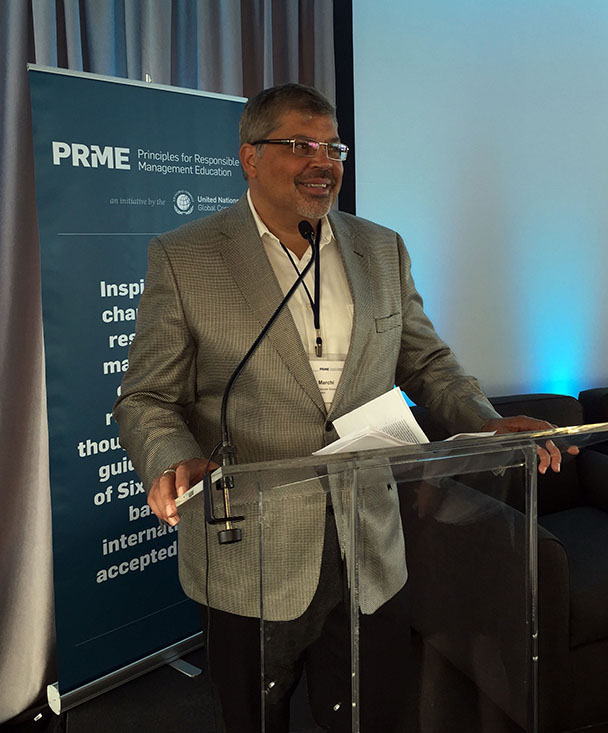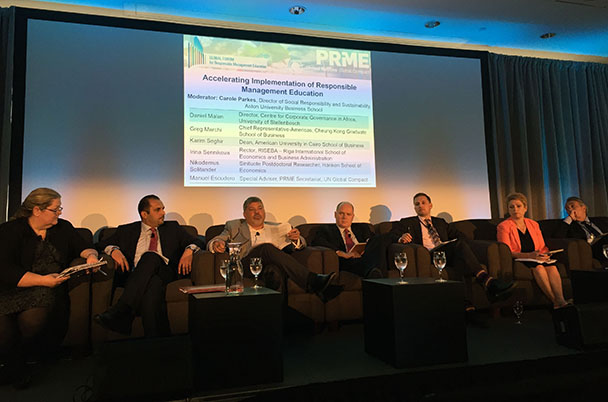Sharing CKGSB’s efforts in social innovation since its very outset, CKGSB Americas Chief Representative Greg Marchi took part in a panel discussion at a conference convened by the Principles for Responsible Management Education (PRME) initiative of the United Nations Global Compact.
The 2015 Global Forum for Responsible Management Education—6th PRME Assembly brought together more than 300 leaders of responsible management education and business, including deans, university presidents, professors, business school accreditation bodies and students, as well as representatives from the UN, government, civil society and corporate sustainability thought leaders.
Marchi spoke as part of a panel discussion on “Accelerating Implementation of Responsible Management Education (RME)”.

CKGSB Americas Chief Representative Greg Marchi speaks at the 2015 Global Forum for Responsible Management Education—6th PRME Assembly in New York on June 23, 2015.
Marchi spoke about the school’s goal to develop a new generation of leaders who can compete with compassion and empathy. “The unique thing about our school is that we focus on the top level of executive education. The majority of our students are senior business executives from around the world. They already have a tremendous amount of wealth when they come to the school—and they also have a tremendous amount of ability to impact social change. When we founded the school, we built social innovation into the DNA of our school.
The majority of CKGSB’s alumni in China are CEOs, chairmans and presidents of some of the leading private businesses in China, Marchi explained. “As a matter of fact, Mr. Liang Xinjun, the CEO of Fosun, who spoke this morning, is an alumnus of CKGSB as is his boss, Mr. Guo Guangchang, the Chairman of Fosun. In addition, Mr. Jack Ma, whom you probably know from Alibaba, is another alumnus,” Marchi said.
From its founding, CKGSB began with a Philanthropy Fund and a Philanthropy Committee. “[The Philanthropy Committee] is a very disciplined committee that includes faculty, administration and alumni. Their mission is to build the most influential on-campus platform for social innovation in China,” Marchi said.
Marchi also outlined:

CKGSB Americas Chief Representative Greg Marchi takes part in a panel discussion on “Accelerating Implementation of Responsible Management Education” in New York.
Marchi also shared some of the initiatives that CKGSB students have accomplished over the short period of time that the school has been in existence.
He highlighted:
“It’s been really amazing and it shows you what a combination of time, effort and money can do,” Marchi said. “When we teach our students about business, it’s not necessarily how to do business, it’s why to do business. It’s not the creation of wealth, it’s the application of wealth.”
Marchi added that CKGSB’s curricula are specifically designed to teach students that philanthropy is not just about contributing money, but contributing time as well. “All our EMBA students, who in most cases have huge companies to run, have to put in 48 hours of community service throughout their 16-month EMBA program in order to graduate to get their degree,” Marchi said.
Marchi admitted that there are many challenges ahead in China, but said that CKGSB will continue to teach its students to fulfill corporate and individual social responsibilities. “While China is moving along, there’s a long way to go. At our school and among our alumni, we are trying to do the best we can and to make these efforts count,” he said.